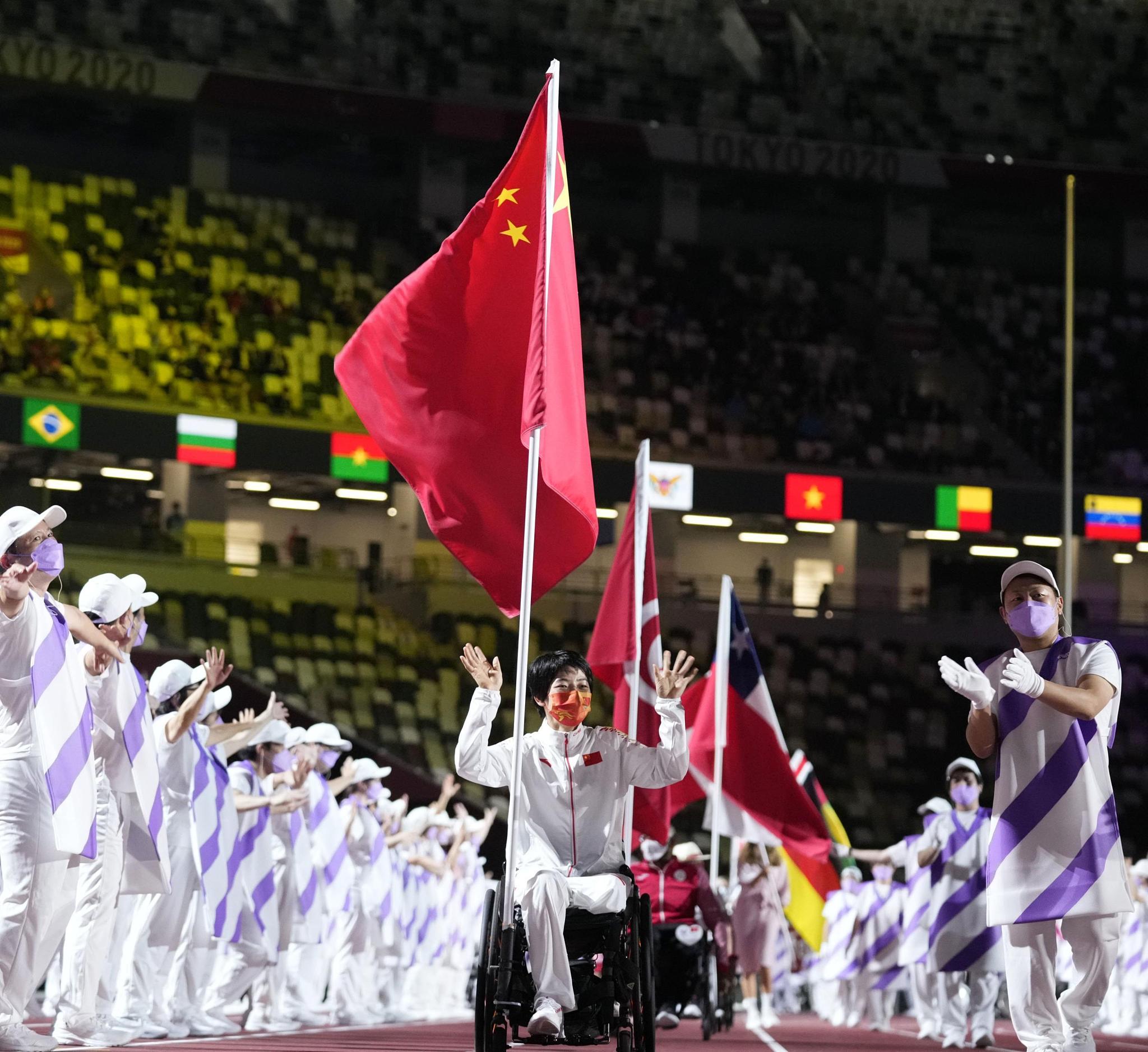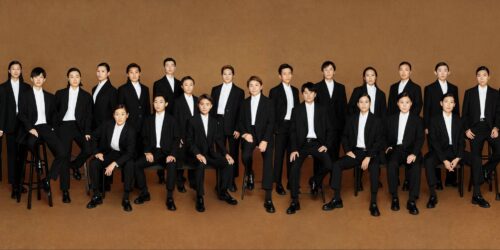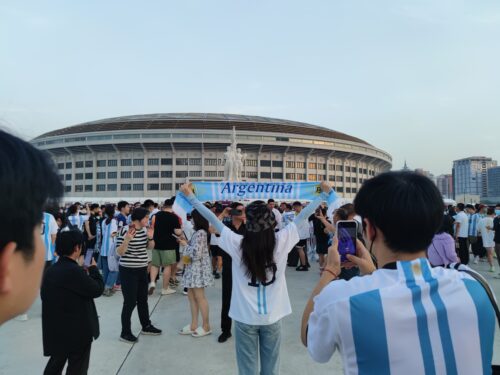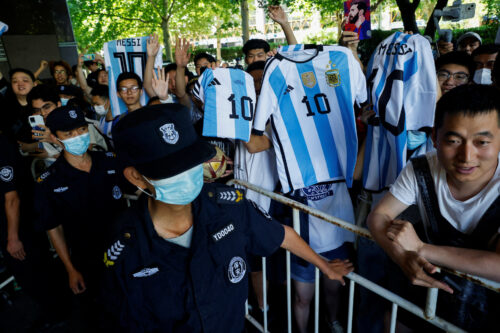China finish top of the medals table for fifth consecutive Paralympics
Also: China's men's soccer team outplayed in two World Cup qualifiers, losing to Australia and Japan.

China continued its streak of dominance in the Paralympics, topping the Tokyo medals table with 96 golds, 60 silvers, and 51 bronzes. This is the fifth straight Paralympics in which China’s come out on top.
Great Britain and the U.S. were second and third.
In the closing ceremony, the flag-bearer was Zhang Xuemei, who helped take the Chinese women’s wheelchair basketball team to a silver medal, its best finish ever.
On the final day of action, badminton star Cheng Hefang finally won her gold medal after just missing out in the doubles. The 26-year-old was able to get the job done over three games against Indonesia’s Leani Ratri Oktila, who defeated Cheng in the doubles days earlier. Meanwhile, the men’s doubles of Qu Zimo and Mai Jianpeng took gold in the wheelchair final by beating the South Korea duo of Kim Jung-jun and Lee Dong-seop.
Earlier on the final day of competition, Li Chaoyan set a new Paralympic marathon record of two hours, 25 minutes, and 50 seconds to win gold in the men’s T46 race, over a minute ahead of his nearest rival.
While the medal count was down from the Rio haul of 107 golds and 239 total, the result still represents a great success for China. The result also embodies the country’s commitment to the Paralympics and disabled sport, especially when compared to some of the other strong Olympic nations. China is reaping the benefits for long-term, sustained Paralympic funding.
Let’s check in on the five athletes we said to keep an eye on:
Wú Chūnyàn 吴春艳, archery
Failed in her quest for Paralympic gold, settling for a pair of bronzes in women’s recurve and mixed team recurve.
Táng Xuěméi 唐雪梅, sitting volleyball
As expected, the Chinese and American women’s sitting volleyball teams faced off for gold. Once again, as in Rio 2016, it was the U.S. that came out on top:
Jiǎng Yùyàn 蒋裕燕, swimming
16-year-old Jiang, making her Paralympics debut, won two golds, in the women’s 50m butterfly (S6) and 400m freestyle. She added a silver and bronze to her haul as well, making her one of the stars of the Games.
Liú Yǔtóng 刘禹彤, badminton
Another wunderkind, 17-year-old Liu Yutong, won gold by beating her countrywoman, Xu Tingting, in the finals.
Cuī Zhé 崔哲, powerlifting
Cui won silver, losing out to Nigeria’s Latifat Tijani.
~
China outplayed in first World Cup qualifier, Japan up next
China was thoroughly outclassed by Australia in the opening game of the third round of Asian World Cup Qualifying last Thursday, losing 3-0 in a game played in Qatar due to COVID protocols. The team was dominated in nearly every facet of the game, and by the end of night had only seven shots, none of them on target (compared to 23 shots for Australia, nine of them on target).
Stars Wǔ Lěi 武磊 and the Brazilian-Chinese Ài Kèsēn 艾克森 had a brief flash in the opening minutes, but warning signs began to show in the 17th minute, with Jackson Irvine nearly turned an overhit corner into the Chinese net. Minutes later, Australia had another chance after Awer Mabil easily collected a long pass from his halfback.
The weak Chinese press was exposed just two minutes later as, once again, Mabil collected a long ball in space and was able to get the shot away. Despite a solid save from Yán Jùnlíng 颜骏凌, the defense could not clear the ball, and Adam Taggart was able to muscle his way through Yú Dàbǎo 于大宝 to put the ball on a plate for Mabil to tap in.
Two minutes later, Australia had a second. Yet another long ball found Taggart in acres of space, and like a carbon copy of Mabil’s first two efforts on goal, the un-pressured Australian striker found it easy to turn and shoot. This time the ball flew past an outstretched Yan.
By the end of the half, China was lucky to be only two goals down.
Coach Lǐ Tiě 李铁 rang the changes at halftime, replacing Zhāng Xīzhé 张稀哲 and center-back Yu Dabao, who Australia had mercilessly targeted. But it didn’t make a difference. China broke once again in the 70th minute, when a well-worked Australian passing combination down the right allowed the Socceroos to open up the left flank with incisive one-touch passing. From the left, Mabil, cutting in on his right foot, was denied by Yan before Mitchell Duke turned in the rebound.
“Australia played a European style of football, they moved fast and played with high intensity,” Li Tie said afterwards. That’s what we need to improve on. I hope my players can learn from the match and grow. We need to adjust quickly to prepare for the next match.”
China will need to tighten up ahead of its next game against Japan. Despite going into the Australian game with a positive formation and mindset, Li struggled to adapt to the Australian movement in the center of the pitch.
Japan will pose the same challenges in the midfield — even as it looks a bit shaky after its shocking 1-0 defeat to Oman last Thursday. China will want to deny Japan the space it needs to release its forwards.
Despite surrendering two-thirds of possession, Oman was able to rely on its organization and play on the counter with long balls. Wu Lei will be crucial with his pace out wide, as it will give China an essential out ball under heavy spells of pressure. His pace can give China the chance to get in behind Japan’s high defensive line.
The game kicks off on Tuesday at 11 p.m. China time.
Update: China lost 1-0 to Japan, though the score doesn’t reflect how much Japan dominated. China wasn’t able to get anything going until the hour-mark, at which point it played a respectable final 30 minutes but still didn’t really come close to equalizing.
The China Sports Column runs every week on The China Project.





